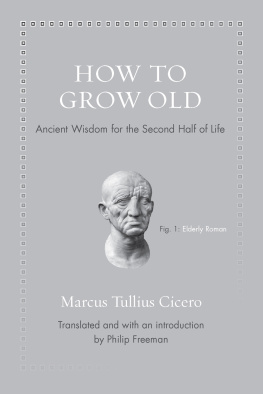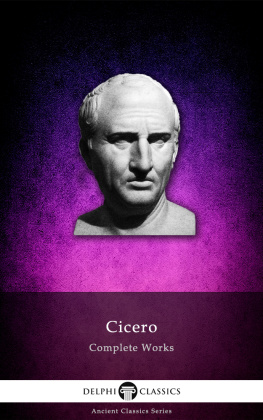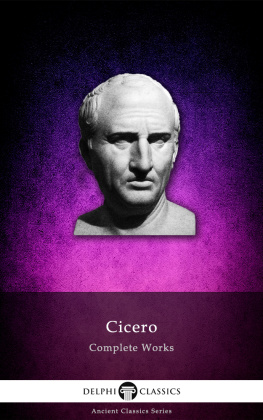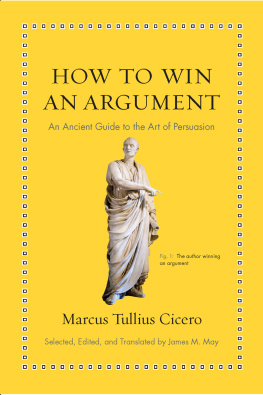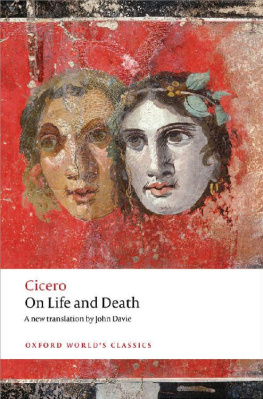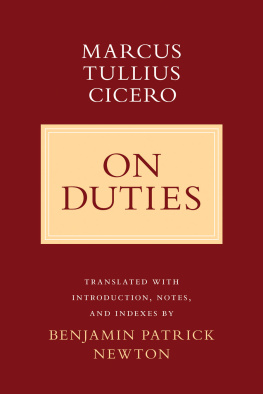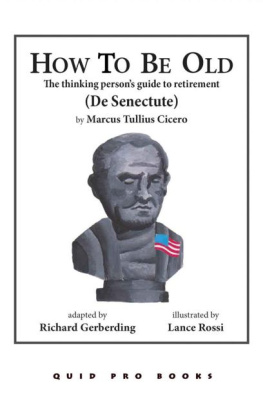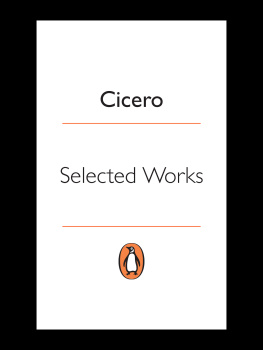
HOW TO GROW OLD
HOW TO GROW OLD

Ancient Wisdom for the Second Half of Life
Marcus Tullius Cicero
Translated and with an introduction by Philip Freeman
PRINCETON UNIVERSITY PRESS
PRINCETON AND OXFORD
Copyright 2016 by Philip Freeman
Requests for permission to reproduce material from this work should be
sent to Permissions, Princeton University Press
Published by Princeton University Press, 41 William Street, Princeton,
New Jersey 08540
In the United Kingdom: Princeton University Press,
6 Oxford Street, Woodstock,
Oxfordshire OX20 1TR
press.princeton.edu
Jacket art: Head of an Old Man (marble) (b/w photo), Roman
(1st century BC) / Palazzo Torlonia, Rome, Italy / Alinari /
Bridgeman Images
All Rights Reserved
Library of Congress Cataloging-in-Publication Data
Names: Cicero, Marcus Tullius, author. | Freeman, Philip, 1961translator. | Cicero, Marcus Tullius. Cato maior de senectute. | Cicero, Marcus Tullius. Cato maior de senectute. English.
Title: How to grow old : ancient wisdom for the second half of life / Marcus Tullius Cicero ; translated and with an introduction by Philip Freeman.
Description: Princeton : Princeton University Press, [2016] | In English and Latin. | Includes bibliographical references.
Identifiers: LCCN 2015024460 | ISBN 9780691167701 (hardcover : acid-free paper)
Subjects: LCSH: Old ageEarly works to 1800.
Classification: LCC PA6308.C2 F7 2016 | DDC 305.26dc23 LC record available at http://lccn.loc.gov/2015024460
British Library Cataloging-in-Publication Data is available
This book has been composed in Garamond and Futura
Printed on acid-free paper.
Printed in the United States of America
1 3 5 7 9 10 8 6 4 2
CONTENTS
INTRODUCTION
Forty-five BC was a bad year for Marcus Tullius Cicero.
The famous Roman orator and statesman was in his early sixties and alone. He had divorced his wife of thirty years not long before and married a younger woman, only to divorce her almost immediately. His beloved daughter Tullia had died at the beginning of the year, plunging Cicero into despair. And his place at the forefront of Roman politics had been lost just four years earlier when Julius Caesar crossed the Rubicon River and forced the Roman Republic into civil war. Cicero could not support Caesar and so, after initially standing against the new dictator and subsequently receiving a humiliating pardon, he had retired to his country estate. There he remained, far from Rome, an old man in his own mind useless to the world.
But rather than sinking into his wine cups or committing suicide as his friend the younger Cato had done, Cicero turned to writing. He had been an avid student of Greek philosophy in his youth and longed to make his mark in the literary world by explaining to his Roman countrymen the ideas he had discovered in Plato, Aristotle, and other great thinkers. He was naturally inclined to the Stoic doctrines of virtue, order, and divine providence, as opposed to what he saw as the limited and self-indulgent views of the Epicureans. And so he began to write. In an astonishingly short period of time, working from early morning until late into the night, he produced numerous treatises on government, ethics, education, religion, friendship, and moral duty.
Just before Caesars murder on the Ides of March in 44 BC, Cicero turned to the subject of old age in a short treatise titled De Senectute. In the ancient world as in the modern, human life could be short, but we err when we suppose that the lifespan in Greece and Rome was necessarily brief. Although longevity in antiquity is notoriously difficult to measure, and infant and childhood mortality was certainly high, if men and women reached adulthood, they stood a decent chance of living into their sixties, seventies, or beyond.
Greek authors before Cicero had written about the last phase of life in different ways. Some idealized the elderly as enlightened bearers of wisdom, such as Homers King Nestor, while others caricatured them as tiresome and constant complainers. The poet Sappho from the sixth century BC is perhaps the most striking of all ancient writers on the subject as she mourns the loss of her own youth in a recently discovered fragmentary poem:
my skin once soft is wrinkled now,
my hair once black has turned to white.
My heart has become heavy, my knees
that once danced nimbly like fawns cannot carry me.
How often I lament these thingsbut what can be done?
No one who is human can escape old age.
Cicero, however, wanted to move beyond mere resignation to offer a broader picture of old age. While acknowledging its limitations, he sought to demonstrate that the later years could be embraced as an opportunity for growth and completeness at the end of a life well lived. He chose as spokesman in his fictional dialogue the elder Cato, a Roman leader from the previous century whom he greatly admired. In his brief conversation with two younger friends, Cato shows how old age can be the best phase of life for those who apply themselves to living wisely. He refutes the objections of many critics that old age need be a wretched time of inactivity, illness, loss of sensual pleasure, and paralyzing fear about the closeness of death. Though Cicero pokes fun at seniors such as himself by having Cato digress into rambling asides (such as his extended discourse on farming), he nevertheless affirms old age as a time of life not to be dreaded but to be enjoyed to the fullest.
There are many valuable lessons to be learned from Ciceros little book on aging. Some of the most important are:
1. A good old age begins in youth. Cicero says the qualities that make the later years of our lives productive and happy should be cultivated from the beginning. Moderation, wisdom, clear thinking, enjoying all that life has to offerthese are habits we should learn while we are young since they will sustain us as we grow older. Miserable young people do not become happier as they grow older.
2. Old age can be a wonderful part of life. The senior years can be very enjoyable if we have developed the proper internal resources. Yes, there are plenty of unhappy old people, but they shouldnt blame age for their problems. Their faults, Cicero says, are the result of poor character, not the number of years they have lived.
3. There are proper seasons to life. Nature has fashioned human life so that we enjoy certain things when we are young and others when we are older. Attempting to cling to youth after the appropriate time is useless. If you fight nature, you will lose.
4. Older people have much to teach the young. There is genuine wisdom in life that can be gained only by experience. It is our pleasure and duty as we grow older to pass this on to those younger than us who are willing to listen. But young people also can offer much to their elders, including the pleasure of their lively company.
5. Old age need not deny us an active life, but we need to accept limitations. No eighty-year-old is going to win a foot race against healthy young people in their twenties, but we can still be physically active within the modest constraints imposed on us by our bodies. And there is so much older people can do that doesnt require great physical strength, from studying and writing to offering wisdom and experience to our communities.
6. The mind is a muscle that must be exercised
Next page
